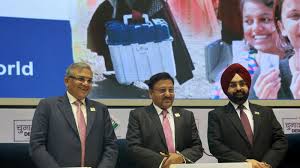Selection Process for Chief Election Commissioner (CEC)

- 12 Jan 2025
In News:
The Chief Election Commissioner and Other Election Commissioners (Appointment, Conditions of Service and Term of Office) Act, 2023 represents a significant shift in the process of selecting the Chief Election Commissioner (CEC) and other Election Commissioners (ECs) in India. Traditionally, the senior-most Election Commissioner automatically ascended to the position of CEC. However, the new law introduced in December 2023 widens the scope for selection, allowing for a more transparent process with an expanded pool of candidates.
Key Features of the Act:
- Election Commission Structure: The Election Commission of India is constituted by the Chief Election Commissioner (CEC) and two other Election Commissioners (ECs). The President of India appoints these members, with the number of ECs fixed periodically.
- Appointment Process: The Act mandates that the CEC and ECs are appointed by the President based on recommendations from a Selection Committee. This committee comprises:
- The Prime Minister (Chairperson),
- The Leader of the Opposition in the Lok Sabha (or leader of the largest opposition party),
- A Union Cabinet Minister appointed by the Prime Minister.
- Search Committee: A Search Committee, chaired by the Minister of Law and Justice, prepares a panel of five candidates. The Selection Committee may choose from this panel or opt for someone outside of it.
- Eligibility Criteria:
- Candidates must have integrity and experience in election management.
- They should be or have been Secretary-level officers or equivalent.
- Term and Reappointment:
- The term of CEC and ECs is six years or until they turn 65 years.
- They cannot be re-appointed after their term.
- Salary and Pension: The salary, allowances, and conditions of service of CEC and ECs are equivalent to those of a Cabinet Secretary.
- Removal Process:
- The CEC can be removed in the same manner as a Supreme Court Judge.
- ECs can be removed only on the recommendation of the CEC.
Departure from Tradition:
Traditionally, the next CEC was the senior-most Election Commissioner. However, the new law opens the process, allowing the Search Committee to consider candidates outside the current pool of Election Commissioners. This widens the net and may lead to a more transparent and inclusive selection.
Concerns and Criticisms: While the Act aims to improve the selection process, it has faced scrutiny and concerns, particularly about the independence of the Election Commission:
- Government Influence: The inclusion of the Leader of Opposition in the Selection Committee is a positive step, but critics argue that the final decision may still be influenced by the government. The government’s dominance in the Selection Committee could potentially affect the neutrality of the Commission.
- Exclusion of the Chief Justice of India (CJI): The Supreme Court's 2023 ruling had recommended including the CJI in the committee, but the new Act excludes the CJI. This has raised concerns about the balance of power and the credibility of the Election Commission.
- Risk of Partisanship: Former CEC O.P. Rawat expressed concerns that political changes might influence decisions, leading to a compromised credibility of the Election Commission.
Legal Challenges: Petitions challenging the exclusion of the CJI from the Selection Committee are currently pending before the Supreme Court, which is expected to address them in February 2025.
Historical Context and Legal Backdrop:
- Article 324 of the Indian Constitution provides for the appointment of CEC and ECs by the President, but this is subject to laws passed by Parliament.
- In 2023, the Supreme Court intervened in response to the growing concerns over the executive's unilateral control over these appointments. The Court's ruling in the Anoop Baranwal v. Union of India case led to the formation of a committee comprising the Prime Minister, Leader of Opposition, and CJI until Parliament could enact a law. This resulted in the Chief Election Commissioner and Other Election Commissioners Act, 2023, which was aligned with the Court's directions.
Implications and Way Forward:
- Potential Government Influence: While the law aims to reduce executive control, the dominant role of the Prime Minister and the Leader of the Opposition could still allow the government to influence appointments, especially in contentious times.
- Suggestions for Reform: The Law Commission had recommended a broader selection committee, including the CJI, to ensure a balanced and impartial selection process. The National Commission to Review the Working of the Constitution (NCRWC) also suggested a committee comprising key political figures, including the Leader of Opposition in the Rajya Sabha and the Speaker of Lok Sabha.
- Integrity of the Election Commission: The credibility and impartiality of the Election Commission are vital for ensuring free and fair elections. It is crucial to ensure that the appointment process not only appears fair but is also free from political interference.
Conclusion:
The Chief Election Commissioner and Other Election Commissioners (Appointment, Conditions of Service and Term of Office) Act, 2023 introduces a reformed approach to the selection of the Election Commission members. While the law aims for greater transparency, it also raises concerns regarding government influence and independence. The Supreme Court’s review of the exclusion of the CJI from the Selection Committee will be pivotal in determining the future trajectory of the Election Commission’s appointment process. The evolving legal and institutional dynamics will play a significant role in shaping the electoral reforms in India.
